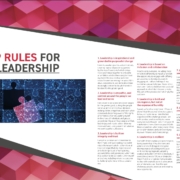Responding to the Resignation Crisis
One of the topics I discuss in my book, Next Generation Leadership, is how to respond to the resignation crisis. I discovered that, among many tactics, one which appears to be highly effective is cultivating an alumni network. If it is true that Generation Y, or Millennials, are leaving their organisations with frightening rapidity, my research show that this is in fact their expectation. They are often anticipating leaving every two to five years from one organisation to the next.
Then, it’s best that we consider how we might allow them to come back at some point in the future. So, they may not stay for more than two to five years at a time, but perhaps we can convince them to come back two, three times over the course of their careers, and in so doing, the develop new, senior leadership skills, customer relations skills, sales skills, whatever it might be, which you didn’t have to pay for, and then you get them back, and you get the benefit of all that new development. So how do we cultivate an alumni network? Well, professional services organisations like McKinsey or Accenture are world class at maintaining their alumni networks, so we can learn a thing or two from them. They even hold reunions in many cases, just as a university would, of their former employees because these people are currently clients, they’re customers, they’re net promoters. You certainly don’t want them to be net detractors!
But what too many organisations do, instead of cultivating those relationships, instead of holding alumni reunions, instead of keeping a social network alive, is when someone resigns they say, ‘Oh, you’re leaving? Ok, leave your swipe card on the desk and don’t let the door hit your butt on the way out.’ That’s certainly not the way forward. We want to keep a workforce, whether it’s in one go at a time or two or three goes at a time because we’re living in a world where young employees want mobility from job to job. Sometimes those future collaborations might be contractor positions instead of full-time employee engagements, and that’s fine. Certainly we need to make working with us as attractive as possible, so that over the course of their careers, we can collaborate with the high potentials for as long as possible. The only thing is – it may not be all in one go.











